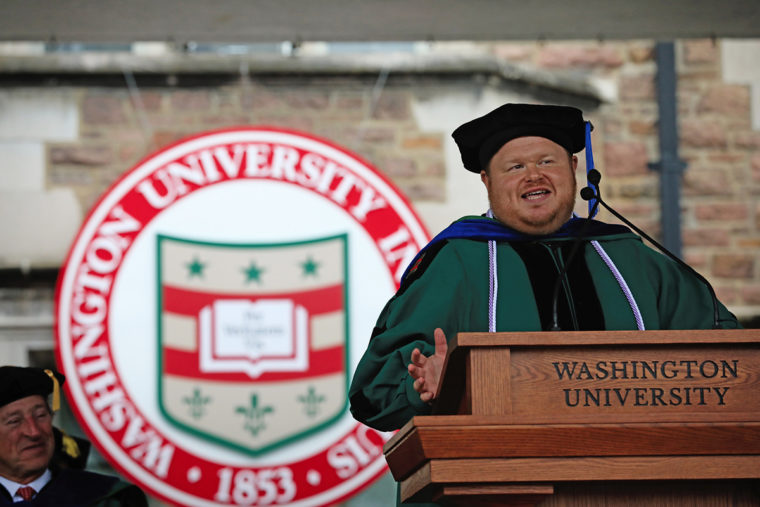Good morning. Thank you Grand Marshall Drobak, Chancellor Wrighton, Dean Tate and everyone here for allowing me time to speak today. I’m thrilled to share this moment with my parents, my brother, my dear friends and all my fellow graduates and their friends and families, many of whom traveled a great distance to be here today.
After receiving the invitation to speak today, I spent a few days reflecting on my experiences at Washington University, and decided that my time as a doctoral student here could best be summed up by this:
About six weeks ago, after many years as a doctoral student, I had the honor of sharing my dissertation research with a multidisciplinary committee of faculty mentors whom I deeply respect. This was followed by a thoughtful discussion of the implications of my work and my future research plans, and then a toast to celebrate a successful defense!
Meanwhile, the university was towing my car.
You see, I’ve learned that to pursue a graduate degree is to open yourself up to a steady stream of successes and challenges. Now, in this instance, the challenge of my car being towed was dwarfed by the success of passing my dissertation defense. But this is rarely the case. Often the challenges seem to far outweigh the successes. Rejected manuscripts, failed experiments, unfunded grant applications, challenging teaching situations, and unsuccessful client meetings — what some would call failures — seem all too common.
Yet, however painful, I believe it is in these moments of failure that we truly grow as scholars and practitioners. Failure can be our best teacher. If we can figure out how to manage the difficult emotions that accompany failure and use these experiences as opportunities to reassess, identify where we can improve, and try again (and again, and again), we will eventually succeed. The fact that we are all sitting here today is a testament to this. Our ability to persist through failure in the search for knowledge was and is essential for success.
As stated in the Washington University motto, we find strength through truth. We find strength to persist in our pursuit of knowledge and the application of that knowledge in ways that improve our local, national and global communities.
We have found strength through truth, but this strength does not go untested. We live in challenging times, times in which the validity and implementation of scientific discovery is consistently interrogated and attacked by many of those elected to lead our nation. The realities and consequences of climate change, systemic racism and health inequity, just to name a few, are often denied. Entire academic fields like the humanities and fine arts are under siege. Still, we persist. We persist because in these challenging times, it is as important as ever to remain strong in our search for and dissemination of truth. Not only truth derived from scientific discovery, but the truth of who we are and who we want to be as a community, a nation, a world.
Truths such as: Black lives matter. Women’s rights are human rights. No human being is illegal. Love is love. Trans is beautiful. Health care is a human right. And, yes, science is real.
As a proud social worker and graduate of the Brown School, I have found strength in partnering with our communities to uncover truth that we hope will lead to improved health. And I am committed to persisting in this search for knowledge and the application of that knowledge in ways that improve the lives of those who are most disadvantaged and oppressed. But this work should not be confined to my field.
Each of you has the ability to use the knowledge and skills you’ve gained at Washington University to the benefit of our communities, our nation, our world. So, regardless of your academic field, whether you will continue in the academy or in the corporate sector, in nonprofit or public service, I ask that you join me in approaching your work through a social justice lens. A lens that allows you to acknowledge the privileges and oppressions experienced by those in your workplace and your communities. And then use this perspective and the knowledge you have gained to make the world a healthier and more just place for its citizens.
The pillars of white supremacy, of heteronormativity, of sexism and other forms of oppression run deep in our institutions. Our work to dismantle these systems of oppression is not easy, and solutions will not quickly be found. But our work is of vital importance to the health and well-being of our communities. Continue to find strength through truth. Persist.
Finally, please remember that persistence through failure eventually leads to success. And persistence requires that success be recognized and celebrated. So, congratulations class of 2018! I wish you all the best in your future endeavors.
Thank you.
